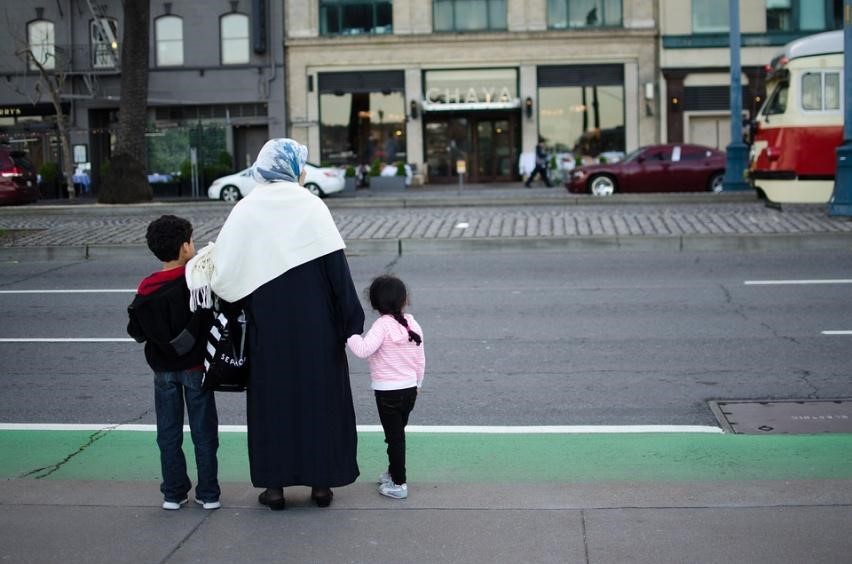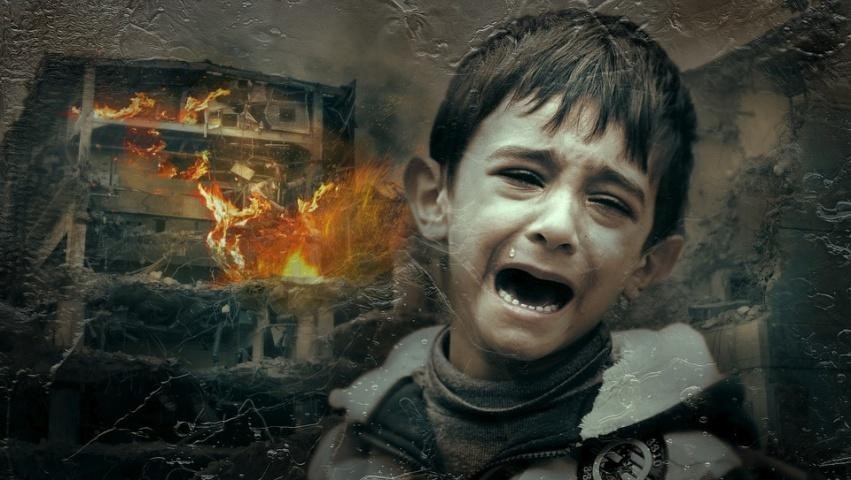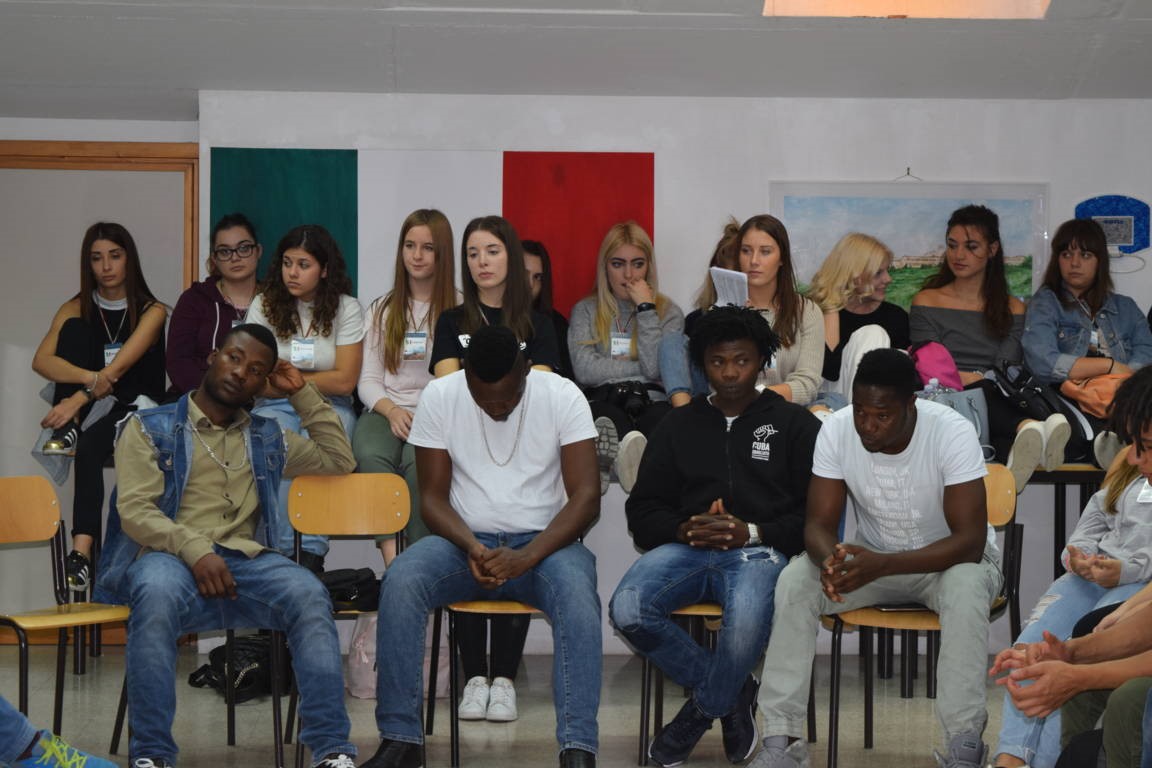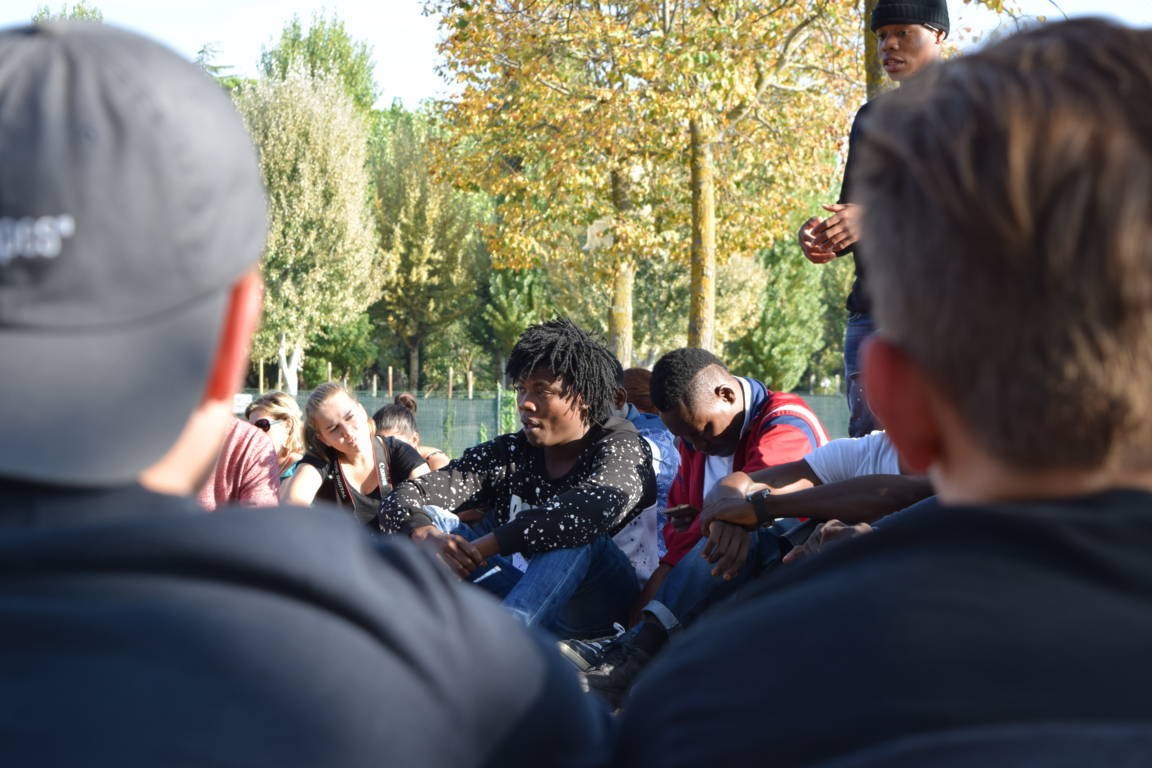Leonella Pippi - 31.10.2017 12:05
Hier tauschen wir unsere Ideen aus! / Here we share our ideas!
josephine ficola - 28.11.2017 21:21
Die Trauer der Reise
By Josephine Ficola and Sofia Sorbelli, LSP Asissi/Italy
Während des Meetings in Assisi hatten wir mehrere Treffen, darunter eines am Trasimenischen See mit den Migranten aus dem Friedenszentrum (Centro Pace) von Assisi. Von dem was sie uns erzählt haben, waren wir sehr beeindruckt, vor allem von den Erfahrungen, die sie auf ihrer Reise erlebt haben. Diese Leute haben uns klar gemacht, dass sie ihr Heimatland überhaupt nicht gerne verlassen haben, hauptsächlich weil sie sich von Familie und Freunden verabschieden und eine sehr gefährliche Reise unternehmen mussten. Sie hätten sich lieber eine Zukunft in ihrer Heimat aufgebaut; das konnten sie aber nicht wegen Krieg, Armut und Krankheiten.


So wollten wir dieses Thema der Reise vertiefen. Wir haben vier verschiedene Geschichten über die Reise dieser Migranten in einem Artikel aus der italienischen Zeitung „Il Fatto quotidiano“ gefunden.
Der sechzehnjährige Bakary hat erzählt, dass er lieber im Meer gestorben wäre, als in seiner Heimat, in Lybien, leben zu müssen, denn in Lybien zu leben bedeutet jeden Tag zu sterben. In der Tat waren die Betten, wo seine Familie und er schliefen, voll mit Insekten, und tote Menschen wurden in der Nähe seines Hauses begraben.
Der Eritreer Abdel B.M. hat über das Grauen seiner Reise berichtet: die Lagerhalle, wo er gefangen gehalten wurde, hatte keine Abwasserentsorgung, und Menschenhändler haben jeden Tag jemanden, ganz zufällig, erschossen.
Gabresellah H. wurde mehrmals während ihrer Reise in einem Haus eingesperrt. Erst später entdeckte sie, dass nur Muslime die Reise überleben durften. Die Christen wurden dagegen alle getötet.
Schließlich erzählt die schwangere Sonia J. in dem Artikel, dass ihr Mann und viele andere Leute im Meer ertrunken sind, nur weil das Schlauchboot überfüllt war und es nicht genügend Schwimmwesten an Bord gab.
Diese Geschichten verdeutlichen die harte Realität, mit der sich Migranten auf ihrer Reise nach Europa konfrontieren müssen. Oftmals verurteilen wir diese Menschen zu schnell und betrachten sie nur als Menschen, die uns unsere Arbeitsplätze und Zukunftsperspektiven wegnehmen wollen. Wir denken dabei nicht an die Gräueltaten hinter ihren Geschichten und an das Leid, das sie während ihrer Reise erfahren haben.
Samuel Kåberg - 08.12.2017 13:50
Here are our toughts and comments on the article " The mourning of the journey" written by Josephine Ficola and Sofia Sorbelli. It is really horrible and devestating that people have to take so much risks to get to Europe. They have to pay a large amount of money for a journey that includes risking their lives. It has been a lot of reports about inflateables that carries a big crowd and collapses in the middle of the ocean. We have to find a better and more human way for these people to travel.
Samuel Kåberg, Victor Peterson, Tova Pettersson, Norma Lindqvist and Julia Wenström
Dóra Börcs - 12.12.2017 13:29
Hallo Josephine und Sofia!
Ich stimme eure Meinung zu. Wir beurteilen diese Menschen zu schnell, obwohl ich es auch verstehen kann, dass einige Menschen davor Angst haben, dass Leute aus einem fremden Land, aus einem fremden Kultur in ihrem Land ankommen und dort weiterleben wollen- oder besser gesagt sollen, weil sie kein anderes Möglichkeit hatten. Aber es ist keine Lösung diese Menschen aus den europäischen Ländern auszuschließen. Sie kommen nicht hier um ein luxuriöses Leben zu haben, sie kommen um ihre Leben zu retten. Die meisten aus ihnen, wie diejenigen, die wir uns getroffen haben, wollen einen Arbeit finden und ihre Leben hier neu aufbauen.
Dóra Börcs
Ilenia Pastorelli - 12.12.2017 15:07
Here you can find the article written by Alessia Massimi on the hard situation immigrants have to face when they decide to leave their country
The price of freedom
By Alessia Massimi, LSP Assisi / Italy
Last October during our Erasmus week in Assisi, we had the chance of meeting some young African immigrants who live in the facilities provided by the Centro Pace of Assisi. While we were listening to their stories I noticed that, when speaking about their journey, they were still scared and almost cried.
I had already read about people our age telling stories about violence, torture and inhumane and degrading treatment in their home country and along the migratory route, particularly in places of detention and seizure in Libya. I knew that they had arrived in Italy in bad physical and psychological conditions. They had seen the death of family members and friends, they had suffered mistreatment and seen horrible things like using people as mobile targets; or they had been locked in dark cells full of excrement and human remains. They had been considered wild animals. They had seen friends or relatives killed for their religious beliefs or their reaction to such oppression.
I knew that the most common and generalized forms of treatment are deprivation of food and water, bad sanitary conditions, frequent beating and other types of trauma; but also that there are other more specific forms of physical and psychological torture that cause severe post-traumatic stress, depression and anxiety.
I had already heard about the tortures they have to suffer before arriving in Europe but those were real stories, told in first person by Godspower, Orasetin, Djibril and Aliou who had come to meet us.
This is why I have decided to write about the price migrants have to pay to reach their freedom.
I believe that this is higher than the price paid with money because people can lose their money but they cannot afford to lose their dignity as humans or their mental health.
We, as European citizens, have the moral duty to help these people, these human beings, to overcome all this through integration in our society and with the psychological help of specialists, to make it possible for them to live a life free from the fear they have experienced. They have suffered to reach freedom, but freedom should not have a price for anyone in the world.
 Photo by Arianna Scarponi
Photo by Arianna Scarponi
annalisa genovese - 18.12.2017 20:39
The cost of freedom
by Annalisa Genovese, LSP Assisi/Italy
Freedom is one of the most precious gifts that every human being has and today, more than in any other historical era, it is a theme and a fundamental value of life... but what is it? By definition, freedom is “the condition of who and what is not subject to controls, constraints and impediments”. In other words, it is the ability to act autonomously. However, apart from the precise definition, the ideal of freedom has always been the subject of several artists and intellectuals who have tried to explain its meaning, to give it a material consistency and to legitimize its existence, underlining its necessity in the real world. For example, think about the philosopher Kant, who speaks of freedom as a "fundamental postulate" or the painter Delacroix, who in the famous painting "Liberté guidant le peuple" represented it through the figure of a proud woman. Long story short, the concept of freedom has always been on our minds, so much so we do not fear losing it. Freedom, however, is not taken for granted in other parts of the world and several populations do not have it, mainly because of wars and dictatorial regimes.
Lack of freedom, therefore, brings about a desperate human need to have it: many people hoping for a better life undertake long journeys in order to go to places where this right is respected, but it is not about simply crossing from one continent to another. These journeys, in fact, are exhausting and they have an average duration of 15 months, during which migrants are abused, put into jail or subjected to violence, torture and inhumane treatment, suffering from hunger and thirst. For this reason, not everyone can reach the desired destination dying along the way. Sometimes the cost of freedom is just too high and unfortunately not everyone achieves it.
I am honestly moved by the strength of migrants and the hope they have during these trips in order to reach their final goal. I firmly believe that before judging the arrival of a disproportionate number of people from the African continent, it would be good to put ourselves in their shoes, to understand their choices, but above all to admire them for the determination to aim for something that we young people have since birth and that we absolutely take for granted, never realizing how lucky we really are.

Migrants telling their stories at the meeting with the Centro Pace last October; Photo taken by Arianna Scarponi
Wiktoria Gawlikowska - 07.01.2018 20:57
Hier sind meine Überlegungen zu Artikel „Die Trauer der Reise“ von Josephine Ficola und Sofia Sorbelii.
Hallo Josephine und Sofia,
Euer Artikel „Die Trauer der Reise“ hat mich stark schockiert, obwohl ich im Fernsehen auch viel darüber gehört habe. Das Thema der Flüchtlinge ist sehr schwer, besonders jetzt und besonders unter den Europäern, weil sie nicht einig sind. Wir leben generell im „friedlichen Wohlstand“ und können die Situation der Flüchtlingen richtig nicht einzuschätzen. Wir haben keine blasse Ahnung vom Grauen des Krieges oder der Hungernot, die in den entfernten Ländern vorkommen. Deshalb ist es uns so schwer, diese Leute zu verstehen und diesen anzuvertrauen, dass sie wirklich aus diesen Gründen geflohen sind. Eigentlich können uns darüber nur die Personen erzählen, die das selbst erlebt haben, und wir sollten versuchen, darauf auch aus eurer Perspektive zu schauen, statt nur diese als Fremde und Feinde zu behandeln. Das ist doch nicht leicht. Gut, dass ihr euer Wissen darüber weiterverbreitet. Das kann jemanden helfen, die Flüchtlinge zu verstehen.
Dóra Dömötör-Nagy - 08.02.2018 17:29
Liebe Josephine und Sofia,
hier findet ihr meinen Kommentar zu euerem Artikel.
Kommentar zum Artikel “Die Trauer der Reise“
von Dóra Dömötör-Nagy, DNG Budapest/Ungarn
Liebe Josephine und Sofia,
mir hat euer Artikel sehr gut gehfallen und ich würde gerne einen Kommentar dazu verfassen. Wie ihr das auch erwähnt habt, haben wir ja in Italien die Möglichkeit, Flüchtlinge, die eine schwierige Reise hinter sich hatten, persönlich kennen zu lernen und mit ihnen über ihre Erfahrungen zu sprechen. Ich muss ganz ehrlich sagen, dass dieses mein Leiblingsprogramm in Italien war, denn es hat meine Augen geöffnet. Ich hatte auch früher schon vieles über gefährliche Reisen der Flüchtlinge gelesen, aber wenn man das von echten Menschen live hört, ist es völlig anders. Dann versteht man ihr Leiden viel mehr. Eben deshalb kann ich meine Mitmenschen empfehlen, sich offen gegenüber Flüchltlinge zu benehmen und zu versuchen, sie persönlich kennen zu lernen, und vieles von ihnen zu lernen.